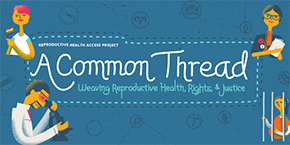Hispanic/Latinx Heritage Month: Luz Alvarez Martinez
 Luz Alvarez Martinez’s name is synonymous with Latina women’s reproductive health activism. Yet even this understates her influence as a leader in fostering and prioritizing the health and well-being of minority women across the United States.
Luz Alvarez Martinez’s name is synonymous with Latina women’s reproductive health activism. Yet even this understates her influence as a leader in fostering and prioritizing the health and well-being of minority women across the United States.
Born in California in 1943 to a family of farmworkers, Martinez began her life of activism as an early supporter of the United Farm Workers. [1] After becoming a nurse midwife in the late 1970s, she got involved with the Berkeley Women’s Health Collective and established a clinic for women of color. On International Women’s Day in 1986, Martinez and a group of Latinas gathered together and concluded that comprehensive healthcare for their community required a new approach – one crafted by Latinas, for Latinas. From there, Martinez helped to co-found the National Latina Health Organization (NLHO), utilizing the self-help framework pioneered by the National Black Women’s Health Project. [2]
Through the 1980s and 90s, Martinez continued to work with women of color to champion lesbian issues, and she advanced a broad health agenda within mainstream reproductive rights groups. She made a point of building and sustaining multiracial coalitions among Latina, Native American, Asian Pacific American, and African American women, participating in the 1994 International Conference on Population and Development in Cairo and the 1995 Fourth World Conference for Women in Beijing. Two years later, she co-founded SisterSong Women of Color Reproductive Health Collective, which aims to build an effective network of individuals and organizations to improve institutional policies and systems that impact the reproductive lives of marginalized communities. Between 1997 and 2005, Martinez served on the Minority Women’s Health Panel of Experts at the National Office of Women’s Health, and has been serving on the Women’s Health Council of the Office of Women’s Health of the State of California for the past 21 years. Though Martinez retired from the NLHO in 2005, she remains the president of the Hispanic United Fund. [3]
Even with Martinez’s ongoing dedication to promoting the health of minority women – especially reproductive health and access – Latinas still face barriers in accessing affordable and available contraception. As a result, Latinas experience unintended pregnancy at twice the rate of their white peers. Further, Latinas are disproportionately poor and birth control can be expensive. According to the Guttmacher Institute, 50% of women aged 18 to 34, including Latinas, said there had been a time when the cost of a prescription contraceptive prevented consistent use. [4]
This data highlights the importance of making certain that minority women – of all colors, cultures, and sexual identities – are not left out in the fight to make competent and comprehensive reproductive healthcare accessible. Martinez’s tireless activism demonstrates the power of partnership in ensuring access to reproductive healthcare and equality in reproductive rights. At the Reproductive Health Access Project, connecting and empowering primary care clinicians is essential to achieving our mission to expand access to abortion, contraception, and miscarriage care. We are inspired by Luz Alvarez Martinez’s organizing and coalition building. Our Reproductive Health Access Network aims to harness the power of over 2,100 primary care clinicians from across the country to work together, provide patient-centered reproductive care, and advocate at the state and local level for access to reproductive health care for all.
